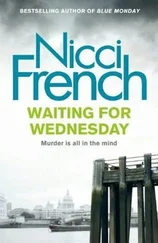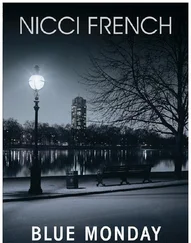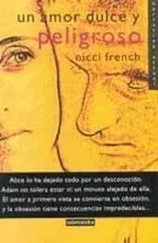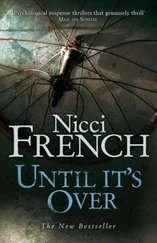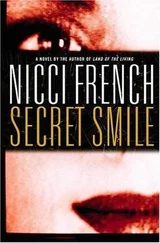In a small road in Poplar that led through boarded-up estates towards the Lea river, a storm drain flooded. At just after three in the morning, the drain cover was dislodged. About ten minutes later, a clump of hair floated to the surface. Beneath it, something glimmered faintly.
But it wasn’t until eight twenty-five the next morning, when the rain had eased to an icy drizzle, that a teenage boy walking his terrier came across the remains of a body that was unmistakably human. Unmistakably that of a woman.
Frieda had woken at five. She liked being in her small, orderly house when the weather outside was wild. Everything was battened down against the rain that flew in bullets against her windows; the gusts of wind sounded like a stormy sea, the foamy rush of an incoming tide. She lay for a while, not thinking, simply listening, but gradually thoughts clarified and pushed their way into her consciousness. The thoughts were people and she could see their faces: Sandy, who was far away but whose fingers touched her when she was asleep, whose arms wrapped around her at last; Alan, with his brown spaniel eyes, who had left his wife and disappeared; his identical twin Dean, dead for more than a year but who stalked her dreams again, always with that amiable and nasty smile; Dean’s wife, Terry; Terry’s sad and careful sister Rose. And then there was Michelle Doyce, with her fading face and her strong, blistered hands, who talked to dead men and stuffed dogs as if they could understand everything she said. Frieda turned towards the window, waiting for the first light to appear through the curtains. Words and phrases flickered through her mind, tiny lights in the darkness. She tried to separate her anxieties and give them a proper name.
Just before six, she got up, pulled on a dressing-gown and went downstairs to light the fire in the living room and make herself a pot of coffee. It was Sunday: she had no patients to see, no conferences to attend, no duties to see to. She had planned to go for a walk through the watery streets, visit the flower market, buy provisions, pop in at her friend’s café, Number 9, for a bowl of porridge or a cinnamon bagel, perhaps spend an hour or so making a drawing in her study, which was like an eyrie at the top of her narrow house. Instead, she sat by the fire, occasionally crouching to blow strength into the flames, drank mug after mug of coffee, and attempted to sort through the events of her week and the murky emotions that had been stirred up by the hearing and by Karlsson’s surprise reappearance in her life.
Then the doorbell rang.
Karlsson looked strange on Frieda’s doorstep, as if he was in fancy dress. He was wearing black jeans, a sweater and a leather jacket, and was damp from the rain. His hair was wet and clung to his skull, making him look older and thinner.
‘You gave me a shock,’ she said. Anxiety curled through her: he was not bringing good news. ‘You’re not wearing a suit.’
‘It’s Sunday,’ he said.
‘Can I get you a coffee?’
‘I don’t think so. Another time perhaps.’
‘Are you going to come in?’
‘Just for a minute.’ He stepped over the threshold. ‘I wanted to tell you that we’re having a meeting about the case tomorrow morning. We’re probably winding it up. I’d like it if you were there. You’ve probably got a patient, though.’
‘What time?’
‘Nine thirty.’
‘I’ve got a gap. I could come for an hour.’
‘Good. Someone you probably know is going to be there. Dr Hal Bradshaw.’
‘I’ve heard of him.’
‘He does some profiling for us. He’s pricey but the commissioner’s keen on him.’
‘I don’t want to get into a turf war.’
‘We’ll be deciding whether to send the case to the CPS. Will you come?’
‘All right,’ said Frieda. ‘But you didn’t arrive at my house early on a Sunday morning to tell me about a meeting.’
‘No.’
Now that the moment had come, he felt unwilling to speak the words.
She looked at him with concern. ‘Come through to the kitchen. I’ll make us that coffee – I’m having some myself anyway and you look like you could do with it.’
He followed her and she pulled a packet of coffee beans from the fridge. She took a white poppy-seed roll from a bag and put it on a plate for him. He stood by the window and watched her, not speaking. Only when the mug of coffee was in front of him and he had taken off his jacket did she sit down opposite him.
‘Tell me, then.’
‘With all the rain,’ he said, ‘there’ve been floods.’ He stopped.
‘Floods …’ Frieda prompted him.
‘Yesterday morning someone’s dog came across some bodily remains floating in a storm drain in Poplar. In the next couple of days, they’re doing the full identity check. Dental records, probably. But I know what they’re going to find.’
Frieda was quite still. She gazed at him with her dark eyes. He put out a hand and laid it across hers for a second. She didn’t respond, but neither did she pull away.
‘Kathy Ripon,’ she said at last.
Kathy Ripon: the young research student whom Professor Seth Boundy, specialist in identical twins and their genetic implications, had sent to Dean Reeve’s house the December before last, following information that Frieda had given him. Kathy Ripon, who had never been seen since but whose parents still waited for. Kathy Ripon, who lay across Frieda’s conscience like an unyielding boulder, and whose narrow, intelligent face appeared to her in dreams and in waking hours.
‘There was a locket,’ said Karlsson, quietly, removing his hand and picking up his mug of coffee.
Frieda had known that Kathy Ripon was dead. She’d known it a hundred per cent. But, even so, she felt as if she had been punched in the stomach. Speaking was a great effort. ‘Do the parents know?’
‘They were told yesterday afternoon. I wanted you to know before you saw it in the papers.’
‘Thank you,’ said Frieda.
‘It was different from the children,’ said Karlsson. ‘Dean didn’t need her. He didn’t want her. He just had to get her out of the way. She was probably dead by the time we heard she was missing.’
‘Probably. Maybe.’ She made a great effort to look at Karlsson. ‘Thank you,’ she said.
‘What? For being the bringer of bad news?’
‘Yes. You didn’t need to.’
‘Yes, I did. There are some things –’ He was interrupted by a harsh electronic version of ‘The March of the Toreadors’. He took his phone from his pocket and looked at it.
She saw his face become grim. ‘Work?’
‘Family.’
‘You should go.’
‘Yeah. Sorry.’
‘That’s fine,’ said Frieda.
After she had let him out, she scarcely moved, just leaned her head against the inside of the door. She tried to stop herself thinking about what it must have been like. That sort of empathy is no good to anybody, she told herself. But still. There had been all the celebrations about the children being found, triumphant press conferences, and all the time Kathy Ripon had been under the ground with nobody coming for her: a clever young woman, hard-working, anxious to please her boss, standing eagerly with her notebook and her researcher’s questions on the rim of the black hole of Dean Reeve’s life – and then being sucked into it.
Frieda hoped so much that Karlsson was right and that Kathy Ripon had died quickly, had not been toyed with or buried alive. You heard of such things: victims knowing their would-be rescuers were above them, but unable to make them hear. She shuddered. For a moment, her little house – huddled in the mews and surrounded by tall buildings, its rooms dim and painted with rich dark colours – felt like a vault rather than a refuge, and she like an underground creature hiding from the bright world.
Читать дальше


